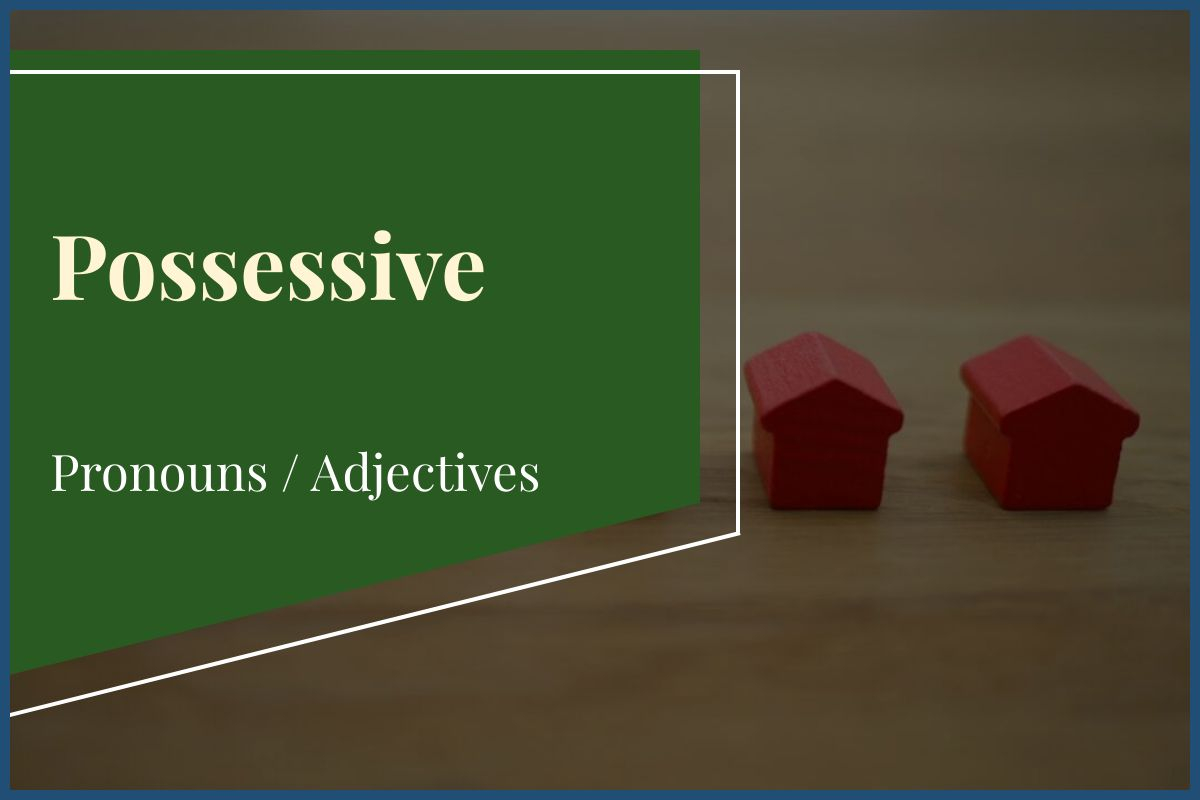
Possessive Pronouns
Possessive pronouns are words that show who owns something without using a noun. They can be used on their own, such as in the sentences “This is mine.” and “Is that yours?”
Here is a table of the possessive pronouns in English:
| Person | Pronoun |
|---|---|
| 1st singular | mine |
| 2nd singular | yours |
| 3rd singular male | his |
| 3rd singular female | hers |
| 3rd singular neuter (for objects and animals) | its |
| 1st plural | ours |
| 2nd plural | yours |
| 3rd plural | theirs |
Possessive Adjectives
Possessive adjectives are words that show who owns something by coming before a noun. For example, in the sentence “My car is red,” the possessive adjective “my” shows that the car belongs to the speaker.
Here is a table of the possessive adjectives in English:
| Person | Adjective |
|---|---|
| 1st singular | my |
| 2nd singular | your |
| 3rd singular male | his |
| 3rd singular female | her |
| 3rd singular neuter (for objects and animals) | its |
| 1st plural | our |
| 2nd plural | your |
| 3rd plural | their |
[ilrc postid=”453″]
Examples

Here are some examples of how to use possessive pronouns and possessive adjectives:
Possessive pronouns:
- This book is mine.
- That pen is yours.
- The dog is his.
- The cat is hers.
- The ball is its.
- This house is ours.
- That car is theirs.
- My favorite game is Genshin Impact. Yours?
- This is my phone. Is that hers?
- Whose gaming console is this? It’s theirs.
- The latest iPhone is the best one yet. Mine is red.
Possessive adjectives:
- My car is red.
- Your house is big.
- His job is difficult.
- Her hair is long.
- Its tail is wagging.
- Our children are happy.
- Their parents are proud.
- I love my new iPhone.
- Your social media posts are always interesting.
- His passion for technology is contagious.
- Her coding skills are impressive.
- Its artificial intelligence capabilities are amazing.
- Our school has a great computer science program.
- Their future careers are in the tech industry.
Tip!
Here is a tip to help you remember the difference between possessive pronouns and possessive adjectives:
- Possessive pronouns can stand on their own, without a noun. For example, “This is mine.”
- Possessive adjectives must come before a noun. For example, “This is my car.”
Practice
- I found some keys on the table. Are they your / yours?
- John and I did our homework. Our / Ours teacher will be proud.
- The book is interesting. Its / It’s plot is captivating.
- Maria and Juan are excited. Their / They’re going on vacation.
- Can I borrow your / yours phone? Mine / My battery is dead.
- They invited us to their party. Our / Ours invitation must have been lost.
- The cat is sleeping on its / it’s favorite cushion.
- This is not my / mine hat. It must be someone else’s.
- Mark is happy with his car, but I prefer my / mine bike.
- Is this seat taken? No, it’s / its free.
- Jenny called to ask if you could pick her / hers up from the airport.
- Is John / John’s car parked outside? I need to move mine / my vehicle.
- Where is your / yours sister? She went to visit her / hers friend.
- The teacher praised Maria / Maria’s presentation. She did an excellent job.
- The cat licked its / it’s paws before curling up in its / it’s favorite spot.
- Is this your / yours coat? I think mine / my is hanging in the closet.
- Paul / Paul’s brother is a doctor. He works at a local hospital.
- Our / Ours neighbors are throwing a party. Do you want to join?
- Lucy / Lucy’s dog is very well-behaved. It follows her / hers commands easily.
- My / Mine parents are originally from Italy. They moved here many years ago.
- Sofia / Sofia’s cousin is a talented musician. She plays the piano beautifully.
- Their / his teachers couldn’t contain their excitement when they won the competition.
- Sarah’s / Sarah colleagues were impressed by her presentation skills.
- The kids were excited to play with their / theirs new toys.
- The students enjoyed his / their visit to the science museum.
- My / Mine mom prepared a delicious meal for our guests.
- The old couple loved sitting on its / their porch and watching the sunset.
- Mary’s dog followed her / her’s command and fetched the ball.
- The book on the shelf is my / mine; please don’t move it.
- The students were excited to see his / their names on the honor roll.
- The actor received an award for his / him outstanding performance in the play.
- The children decorated their / theirs own cupcakes at the birthday party.
- Our / Ours teacher gave us a lot of homework over the weekend.
- Can you please pass me / mine the salt from the table?
- The bird built its / it’s nest high up in the tree.
- Her / Hers parents were proud of his achievements in school.
- The team celebrated their / their’s victory with a victory lap around the field.
- Emily’s cat is very playful. It’s / Its favorite toy is a fluffy mouse.
- The students listened attentively as they’re / their teacher explained the grammar rules.
- The children joined their / their’s friends on the playground for a game of tag.
- My / Mine sister is a talented artist. She creates beautiful paintings.
- The teacher commended her / hers students for their hard work and dedication.
- Is it your / yours turn to take out the trash?
- The flowers in the garden are my / mine; I planted them myself.
- The children looked forward to their / their’s summer vacation.
- My / Mine brother is a chef. He makes the most delicious meals.
- Is this your / yours car? Mine / My car is silver.
- My / Mine friends and I went hiking in the mountains last weekend.
- The children ran to their / theirs parents after school.
- Our / Ours house is located near the beach. We can hear the sound of waves from our backyard.
